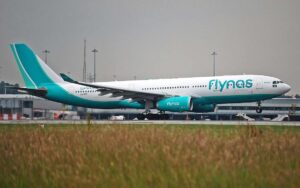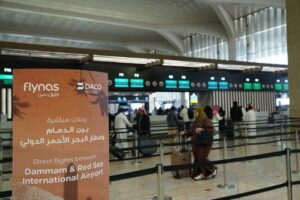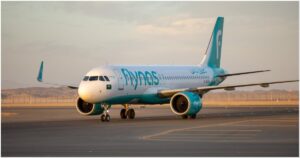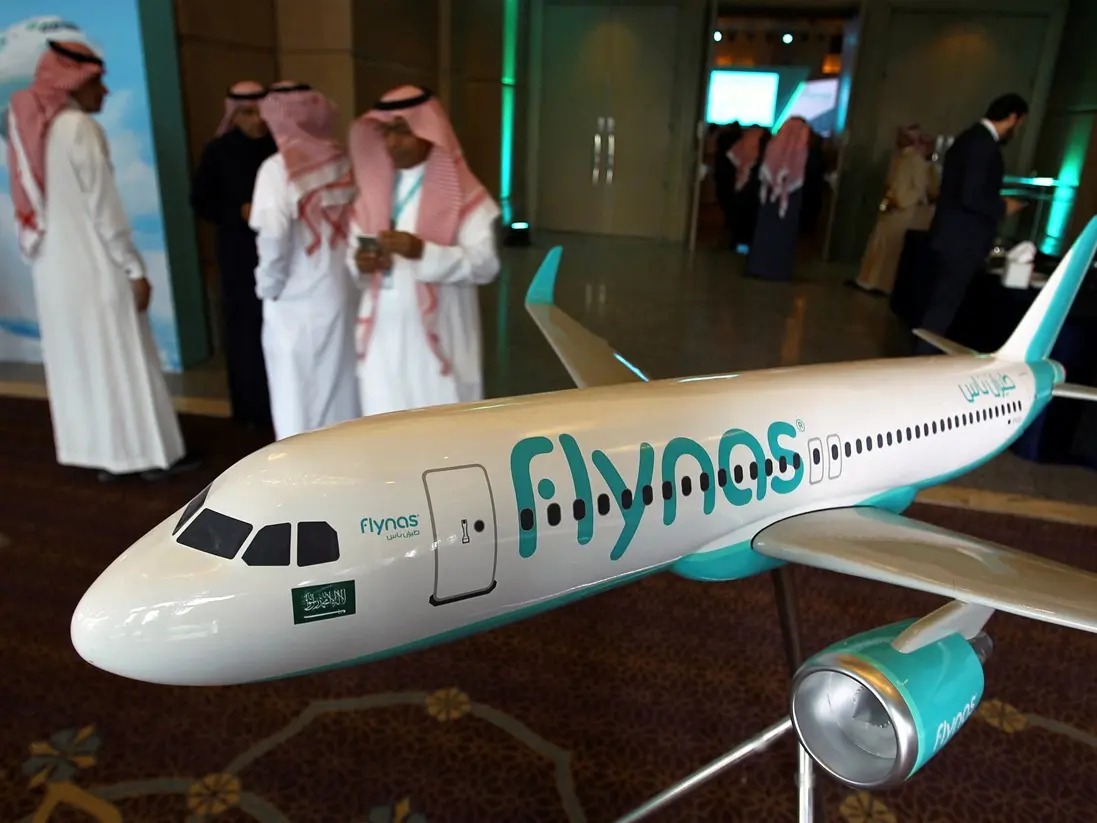8, September,2025-Saudi Arabia’s budget airline, Flynas, has announced its decision to begin direct flights between the Eastern Saudi city of Dammam and the Syrian capital, Damascus, starting next month. This marks a significant step in the airline’s expansion plans as it broadens its network to include Syria, a country that has seen significant political and economic changes in recent years. With this new route, Flynas is positioning itself as a key player in the growing aviation market in the Middle East while simultaneously aligning with broader objectives set by the Saudi Arabian government in aviation and tourism.

Flynas’ Expansion Strategy
Flynas, which has rapidly grown to become one of Saudi Arabia’s most prominent low-cost carriers, has been consistently expanding its network of domestic and international routes since its establishment in 2007. This expansion strategy is driven by the airline’s commitment to increasing its market share both within the kingdom and beyond, particularly in underserved or emerging markets. By introducing direct flights between Dammam and Damascus, Flynas aims to tap into the growing demand for affordable travel options between Saudi Arabia and Syria, creating new opportunities for both leisure and business travel.
The decision to launch this route also follows Flynas’ ongoing efforts to diversify its destinations across the Middle East, Asia, and beyond. In recent years, Flynas has steadily added new international destinations to its roster, with flights to countries including Egypt, Jordan, Turkey, and other regional hubs. The carrier’s expansion into Syria aligns with this strategy, reinforcing its commitment to becoming a major player in the regional aviation market.
Syria: An Emerging Market for Aviation
The announcement of direct flights to Syria reflects the ongoing stabilization of the country following a prolonged civil conflict that has severely impacted its infrastructure, including its aviation sector. In recent years, Syria has started to rebuild, with a gradual return of international airlines to its airports. While the security situation in some parts of the country remains fragile, the growing demand for travel to and from Syria is undeniable. Flynas is well-positioned to meet this demand, particularly as many Syrians living abroad seek affordable and efficient travel options to visit family, conduct business, or explore the region.
The Dammam-Damascus route is expected to serve as a vital link between Saudi Arabia and Syria, particularly for the large Syrian expatriate community residing in the kingdom. Saudi Arabia has long been home to a significant number of Syrian nationals, many of whom have established deep ties with their homeland despite years of instability. The reintroduction of direct flights to Syria offers them a direct, affordable connection to their country of origin, catering to both personal and professional travel needs.

Alignment with Saudi Arabia’s Vision 2030
Flynas’ move to expand its operations into Syria is also closely aligned with the broader goals set out by Saudi Arabia’s Vision 2030. The Vision, which seeks to diversify the kingdom’s economy away from its reliance on oil, emphasizes the importance of developing the aviation and tourism sectors as key pillars of economic growth.
A critical part of Vision 2030 is the kingdom’s aspiration to increase its connectivity with international markets, enhancing its position as a regional hub for travel and trade. By introducing new international routes, including those to emerging and high-demand destinations, Saudi airlines like Flynas contribute to achieving these objectives. Flynas, in particular, plays an essential role in helping to make air travel more affordable and accessible, supporting both tourism and business sectors.
The direct flight from Dammam to Damascus is part of a larger pattern of regional integration, as Saudi Arabia works to strengthen its relationships with neighboring countries through improved travel infrastructure. As the Saudi government works to enhance its diplomatic and economic ties with Syria, Flynas’ decision to operate this route also signals a willingness to further these efforts by facilitating increased people-to-people connectivity.
Economic and Tourism Benefits
The introduction of direct flights between Dammam and Damascus has the potential to yield significant economic and tourism benefits for both countries. For Saudi Arabia, the new route supports the kingdom’s goal of diversifying its tourism industry by attracting visitors to the country. By improving connectivity to Syria, Flynas can help bring more international tourists to Saudi Arabia as well. The kingdom’s evolving tourism landscape includes efforts to draw travelers from across the Middle East, Asia, and Europe, and expanded air routes play a vital role in supporting these initiatives.
From an economic perspective, the route will likely encourage trade and business ties between Saudi Arabia and Syria. The proximity between the two countries, as well as the ease of travel facilitated by direct flights, will likely open up new opportunities for trade, investment, and collaboration in industries such as construction, energy, and technology. Given that Syria is in the process of rebuilding after years of conflict, the demand for goods, services, and expertise from neighboring countries, particularly in the Middle East, is expected to rise.
In addition, Syria’s historical and cultural significance as a key destination in the Arab world holds great appeal for travelers from Saudi Arabia and beyond. The re-establishment of direct flights between Dammam and Damascus can also foster cultural exchange, allowing both Saudi and Syrian nationals to reconnect with their shared heritage. For many Saudis, Syria holds cultural and religious significance, particularly due to its proximity and the longstanding ties between the two nations.
More News UAE government’s new offer, Indians will now get Golden Visa
Flynas’ Competitive Advantage in the Low-Cost Travel Market
Flynas has gained a reputation for offering affordable air travel, especially for short- to medium-haul flights within the Middle East. As the airline continues to expand its fleet and add new destinations, it is increasingly becoming a competitive alternative to both full-service carriers and other regional low-cost airlines. The direct Dammam-Damascus route is expected to be an attractive option for both budget-conscious travelers and those seeking flexibility and convenience.
By operating as a low-cost carrier, Flynas appeals to a wide demographic of customers who are seeking affordable options for both business and leisure travel. For many Syrians in the region, the affordability of Flynas will make it the airline of choice for trips to and from their home country. The airline’s consistent focus on offering low fares, while maintaining a solid safety record and operational efficiency, allows it to meet the needs of both domestic and international travelers.

Looking Ahead: Potential for Further Growth
Flynas’ new route to Damascus is only one part of a broader expansion plan that sees the airline continuously working to enhance its network and services. As the airline explores further international routes, especially to countries that are experiencing periods of recovery and growth, Flynas is poised to further capitalize on emerging market opportunities. The Dammam-Damascus connection represents a step forward for Flynas, but it could also pave the way for more flights to additional Syrian cities or other destinations in the Levant and broader Middle East region.
In conclusion, the launch of direct flights between Dammam and Damascus next month is a significant milestone for both Flynas and the broader Middle East aviation market. This route expansion aligns with the kingdom’s aviation and tourism objectives as part of Saudi Arabia’s Vision 2030, positioning Flynas as a key player in regional connectivity. As the airline continues to grow and expand its offerings, its role in enhancing economic, cultural, and tourism links between Saudi Arabia and Syria will undoubtedly strengthen in the years to come.




